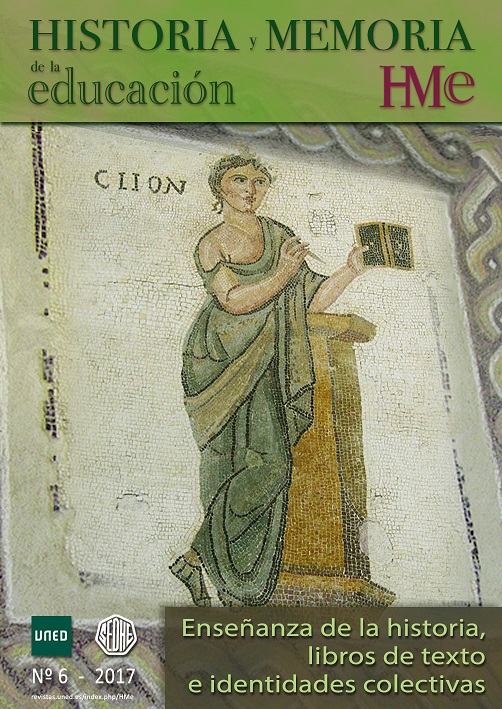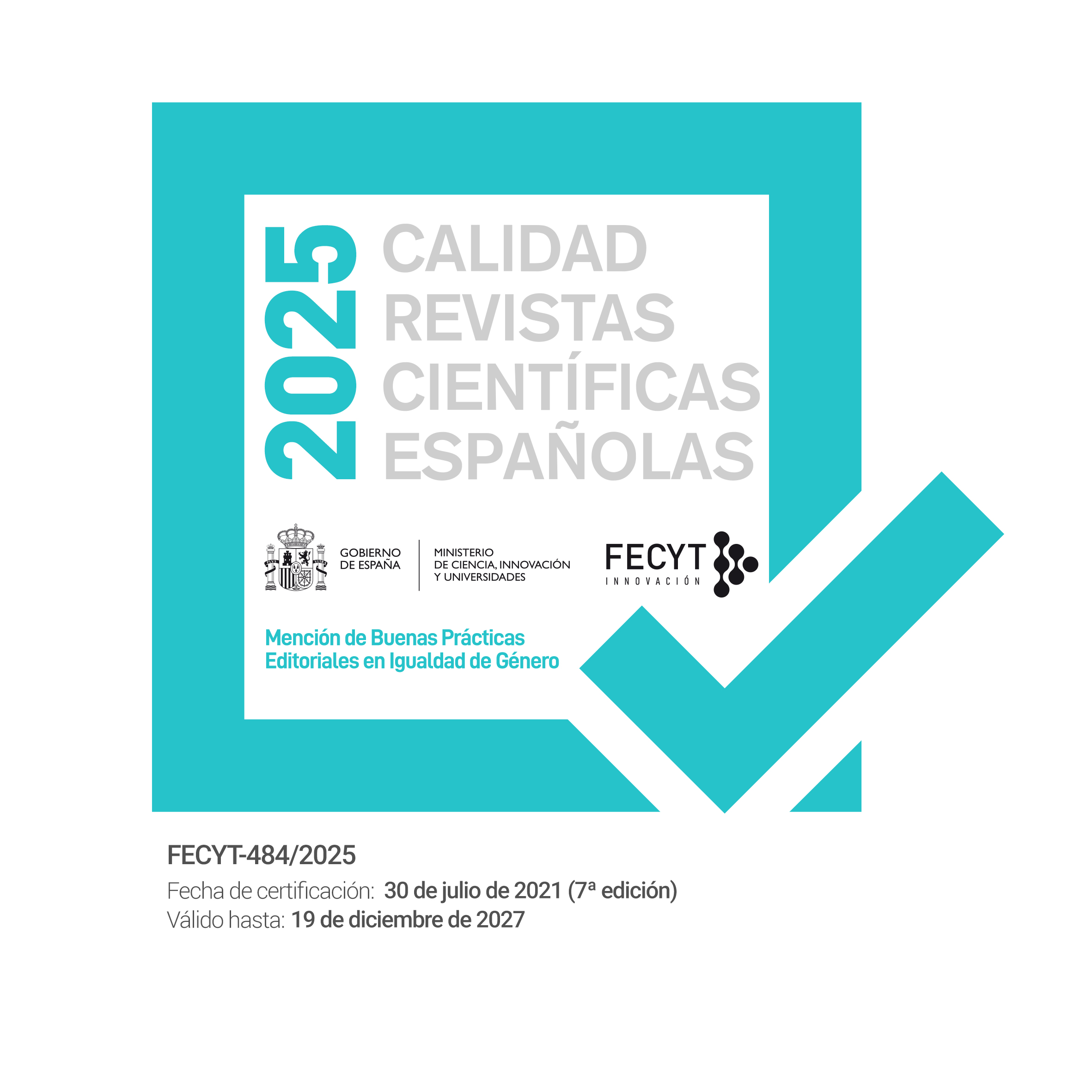Spanish national narrative in secondary education: Reconquest, Catholic Monarchs and Empire in history textbooks and students’ accounts
DOI:
https://doi.org/10.5944/hme.6.2017.17137Keywords:
History textbooks, National narrative, Students’ historical accounts, Secondary education, History of SpainAbstract
This paper examines the survival of a master narrative about the history of Spain, a national narrative as it is reflected in history textbooks in secondary education between 1976 and 2016 and in current historical accounts of students and teachers-in-training. The aim is to analyze three subjects of this master narrative (the Reconquest, the Catholic Monarchs and the Spanish Empire) that continue to have their place in history textbooks. We analyze the contents and forms of discourse with this aim: to demonstrate to what extent the political, educational and historiographical changes have transformed the national historical representation of such contents as a national discourse. This is an empirical, exploratory and descriptive study based on discourse analysis using a probability sample from history textbooks. This analysis is then compared with studies on historical accounts of Spain given by students and teachers-in-training. The results show a duality between textbooks and historical accounts of adolescents and youth. On the one hand, we see significant changes in academic texts from school textbooks without an essentialist national dimension; but we also see continuity in the discursive thread of the master narrative (reconquest-unit-empire), and with maps of «Spain» from the 16th century and with images of national historical painting from the nineteenth century. On the other hand, we can see the continuity of essentialist and traditional representations of such contents in historical accounts of students and teachers-in-training. This is due principally to poor historical literacy in secondary education and the survival of a national master narrative in non-school social uses of the national historical past.
Downloads
References
Álvarez Junco José. Dioses útiles. Naciones y nacionalismo. Madrid: Galaxia Gutteberg, 2016.
Álvarez Junco, José, coord. Las historias de España. Visiones del pasado y construcción de identidad, In Historia de España vol. 12, edited by Josep Fontana and Ramón Villares. Madrid: Marcial Pons, 2013.
Archilés, Ferran, and Ismael Saz, ed. Naciones y estado. La cuestión española. Valencia: PUV, 2014.
Archilés, Ferran. «Melancólico bucle. Narrativas de la nación fracasada e historiografía española contemporánea». In Estudios sobre nación y nacionalismo en la España contemporánea, edited by Ismael Saz and Ferran Archilés, 245-330. Zaragoza: Prensas Universitarias de Zaragoza, 2011.
Balibar, Etiene. «La forma nación: historia e ideología». In Raza, nación y clase, edited by Immanuel Wallerstein and Etiene Balibar, 135-167. Madrid: IEPALA, 1991.
Barca, Isabel, and Mª Auxiliadora Schmidt. «La consciencia histórica de los jóvenes brasileños y portugueses y su relación con la creación de identidades nacionales». Educatio Siglo XXI 31 (1) (2013): 25-46.
Barton, Keith, and Linda Levstik. Teaching History for the Common Good. Nueva York-Londres: Routledge, 2004.
Barton, Keith. «A sociocultural perspective on children’s understanding of historical change: comparative findings from Northern Ireland & the United States». American Educational Research Journal 38 (2001): 881-893.
Barton, Keith. «School History as a Resource for Constructing Identities: Implicacions for Research from the United States, Northern Ireland and New Zeland». In History Education and the Construction of National Identities, edited by Mario Carretero, Mikel Asensio and María Rodríguez Moneo, 93-108. Charlotte CT: IAP, 2012.
Berger, Stephan, and Chris Lorenz. «Introduction». In Nationalizing the Past. Historians as Nations Builders in Modern Europe, edited by Stephan Berger and Chris Lorenz,1-25. Londres: Palgrave McMillan, 2010.
Berger, Stephan, and Christoph Conrad. The Past as History. National Identity and Historical Consciousness in Modern Europe. Londres: Palgrave McMillan, 2015.
Berger, Stephan. «De-Nationalizing History and Nationalizing It Differently! Some Reflections on How to Defuse the Negative Potential of National(ist) History Teaching». In History Education and the Construction of National Identities, edited by Mario Carretero, Mikel Asensio and María Rodríguez Moneo, 33-48. Charlotte CT: IAP, 2012.
Berger, Stephan. «Narrating the Nation: Historiography and Other Genres». In Narrating the Nation Representations in History, Media and Arts, edited by Stephan Berger, Linas Eriksonas and Andrew Mycock, 1-16. Nueva York-Oxford: Berghahn, 2008.
Berger, Stephan. «Retorn al paradigma nacional? L’escriptura de la història nacional a Alemanya, Itàlia, França i el Regne Unit del 1945 al present». In La persistència de la nació. Estudis sobre nacionalisme, edited by Ferran Archilés, 101-182. Valencia: PUV, 2015.
Bernal, Antonio M. «Monarquía e imperio». In Historia de España vol. 3, edited by Josep Fontana and Ramón Villares. Madrid: Marcial Pons, 2007.
Bernal, Antonio M. «Colonias, imperio y estado nacional». In Historia de las Españas. Una aproximación crítica, edited by Juan Romero and Antoni Furió. Valencia: Tirant Humanidades, 2015.
Bhabha, Homi. «Introducción: narrar la nación». In Nación y narración. Entre la ilusión de una identidad y las diferencias culturales, edited by Homi Bhabha, 1-11. Madrid: Siglo XXI, 2010.
Billig, Michael. Nacionalismo banal. Madrid: Capitán Swing, 2014.
Carretero, Mario, and Marian Kriger. «¿Forjar patriotas o educar cosmopolitas? El pasado y el presente de la historia escolar en un mundo global». In Aprender y pensar la historia, edited by Mario Carretero y James Voss, 71-98. Buenos Aires: Amorrortu, 2004.
Carretero, Mario, Mikel Asensio and María Rodríguez Moneo, ed. History Education and the Construction of National Identities. Charlotte CT: IAP, 2012.
Carretero, Mario. Constructing Patriotism. Teaching History and Memories in Global Worlds. Charlotte CT: IAP, 2011.
Elliot, John. Imperios del mundo atlántico. España y Gran Bretaña en América (1492-1830). Madrid: Taurus, 2006.
Foster Stuart, and Keith Crawford, eds. What Shall We Tell the Children? International Perspectives on School History Textbooks. Greenwich. Connecticut: IAP, 2006.
Foster, Stuart. «Dominant Traditions in International Textbook Research and Revision». Education Inquiry 2 (1) (2011).
Foster, Stuart. «Re-thinking historical textbooks in a globalized world». In History Education and the Construction of National Identities, edited by Mario Carretero, Mikel Asensio and María Rodríguez, 49-62. Charlotte CT: IAP, 2012.
Fuchs, Eckhardt. «Currents trends in History and Social Studies Textbook Research». Journal of International Cooperation in Education 14 (2) (2011): 17 -34.
Furió, Antoni. «Las Españas medievales». In Historia de las Españas. Una aproximación crítica, edited by Juan Romero and Antoni Furió, 77-145. Valencia: Tirant Humanidades, 2015.
García Cárcel, Ricardo. Las herencias del pasado. Las memorias históricas de España. Madrid: Galaxia Gutenberg, 2013.
García Fitz, Francisco. La Reconquista. Granada: Universidad de Granada, 2010.
Gómez, Cosme J., and Pedro Miralles. «¿Pensar históricamente o memorizar el pasado? La evaluación de los contenidos históricos en la educación obligatoria en España». Revista de Estudios Sociales 52 (2015): 52-48.
Gómez, Cosme J., Raimundo Rodríguez and Pedro Miralles. «La enseñanza de la Historia en Educación Primaria y la construcción de una narrativa nacional. Un estudio sobre exámenes y libros de texto en España». Perfiles Educativos XXXVII (150) (2015): 20-38.
Grever, Maria, and Siep Stuurman, ed. Beyond the Canon: History for the 21st century. London: Palgrave Macmillan, 2007.
Guyver, Robert, ed. Teaching History and the Changing Nation State. Transnational and Intranational Perspectives. Londres: Bloomsbury, 2016.
Kamen, Henry. Del imperio a la decadencia. Los mitos que forjaron la España moderna. Madrid: Temas de Hoy, 2006.
Kamen, Henry. Imagining Spain. Historical myth and national identity. New Haven y Londres: Yale University Press, 2008.
Kropman, Marc, Carla Van Boxtel and Janest Van Drie. «Small country, great ambitions: Prospective teachers’ narratives and knowledge about Dutch history». In Joined-up history: New Directions in History Education Research, edited by Arthur Chapman and Arie Wilschut, 57-84. Charlotte: IAP, 2015.
Lee, Peter. «From National Canon to Historical Literacy». In Beyond the Canon: History for the 21st century, edited by Maria Grever and Siep Stuurman, 19-30. London: Palgrave Macmillan, 2007.
Leeuw-Roord, Joke van der, «Two Steps Forward, One Step Back: Shoring Our Stories and Looking for the Common Threads». In Making a Difference: Fifteen years of EUROCLIO, edited by Dean Smart, 66-73. La Haya: EUROCLIO, 2007.
Leeuw-Roord, Joke van der, ed. History changes. Facts and figures about history education in Europe since 1989. La Haya: EUROCLIO, 2004.
Leeuw-Roord, Joke van der. «Two Steps Forward, One Step Back». In Beyond the Canon: History for the 21st century, edited by Maria Grever and Siep Stuurman. London: Palgrave Macmillan, 2007.
Lévesque, Stephane, Jean-Philippe Croteau and Raphael Gani. «Conscience historiques des jeunes francophones d’Ottawa: sentiment d’appartenance franco-ontarienne et récit du passe». Revue du Nouvel-Ontario 40 (2015): 177-228.
López Facal, Ramón, and Jorge Sáiz. «Spain: History Education and Nationalism Conflicts». In Teaching History and the Changing Nation State, edited by Robert Guyver, 201-215. Londres: Bloomsbury, 2016.
López Facal, Ramón. «Identificación nacional y enseñanza de la historia (1970-2008)». Historia de la Educación 27 (2008): 171-193.
López Facal, Ramón. «La nación ocultada». In La gestión de la memoria. La historia de España al servicio del poder, edited by Juan Sisinio Pérez Garzón et al., 111-160. Barcelona: Crítica, 2000.
Martínez Millán, José. «La dinastía Habsburgo en la historiografía española de los siglos XIX y XX». Libros de la Corte.es 7 (2013): 33-58.
Muñoz, Jordi. La construcción política de la identidad española: ¿del nacionalcatolicismo al patriotismo democrático?. Madrid: CIS, 2012.
Pérez Garzón, Juan Sisinio. «¿Por qué enseñamos Geografía e Historia? ¿Es tarea educativa la construcción de identidades». Historia de la Educación 27 (2008): 37-55.
Pérez Garzón, Juan Sisinio. «El nacionalismo español: los resortes de una hegemonía política y cultural». In Pensar històricament. Ètica, ensenyament i usos de la historia, edited by Marició Janué, 123-145. Valencia: PUV, 2009.
Pérez Vejo, Tomás. España imaginada. Historia de la invención de una nación. Madrid: Galaxia Gutenberg, 2015.
Peris, Álvar. «Nación española y ficción televisiva. Imaginarios, memoria y cotidianidad». In La nación de los españoles. Discursos y prácticos del nacionalismo español en la España contemporánea, editeb by Ferran Archilés, 392-418. Valencia: PUV, 2012.
Pingel, Falk. UNESCO Guidebook on Textbook Research and Textbook Revision. Paris y Braunschweig: Unesco & Georg-Eckert-Institut, 2010.
Repoussi, Maria, and Nicole Tutiaux-Guillon. «New Trends in History Textbook Research. Issues and Methodologies toward a School Historiography». Journal of Educational Media, Memory and Society 2 (1) (2010): 154-170.
Ríos Saloma, Martín. «From the Restoration to the Reconquest: The construction of a national myth (An historiographical review. 16th -19th centuries)». La España medieval 28 (2005): 379-414.
Ríos Saloma, Martín. La Reconquista en la historiografía española contemporánea. Madrid: Sílex, 2013.
Ríos Saloma, Martín. La Reconquista. Una construcción historiográfica (siglos XVI-XIX). Madrid: Marcial Pons, 2011.
Ruiz, Pedro. «Los usos de la historia en las distintas maneras de concebir España». In Historia de las Españas. Una aproximación crítica, edited by Juan Romero and Antoni Furió, 27-75. Valencia: Tirant Humanidades, 2015.
Sáiz, Jorge, and Isabel Barca. «Students narrating their nation. Models of national narratives of Spanish and Portuguese students». London Review of Education (en prensa).
Sáiz, Jorge, and Carlos Fuster. «Memorizar historia sin aprender pensamiento histórico. Las PAU de Historia de España». Investigación en la escuela 84 (2014): 46-57.
Sáiz, Jorge, and Cosme J. Gómez. «Investigar el pensamiento histórico y narrativo en la formación del profesorado: fundamentos teóricos y metodológicos». Revista Electrónica Interuniversitaria de Formación del Profesorado 19 (1) (2016): 175-190.
Sáiz, Jorge, and Neus Colomer. «La historia moderna peninsular en narrativas de estudiantes al finalizar la ESO». In La Edad Moderna en Educación Secundaria. Experiencias de investigación, edited by Francisco García, Cosme J. Gómez and Raimundo Rodríguez, 155-167. Murcia: Editum, 2016.
Sáiz, Jorge, and Ramón López Facal. «Competencias y narrativas históricas. El pensamiento histórico de estudiantes y futuros profesores». Revista de Estudios Sociales 52 (2015): 87-101.
Sáiz, Jorge, and Ramón López Facal. «Narrativas nacionales históricas de estudiantes y profesorado en formación». Revista de Educación 374 (2016): 118-141.
Sáiz, Jorge, Cosme J. Gómez and Ramón López Facal. «Narrativas nacionales y competencia histórica entre futuros maestros de Educación Primaria en España». Arbor (en prensa, 2017).
Sáiz, Jorge. «¿Hay sitio para la Edad Media en las enseñanzas primaria y secundaria?». In Nuevos temas, nuevas perspectivas en historia medieval, edited by Ester López, 183-214. Logroño: IER, Instituto de Estudios Riojanos, 2015.
Sáiz, Jorge. «Actividades de libros de texto de Historia, competencias básicas y destrezas cognitivas, una difícil relación: análisis de manuales de 1º y 2º de ESO». Didáctica de las Ciencias Experimentales y Sociales 25 (2011): 37-64.
Sáiz, Jorge. «Alfabetización histórica y competencias básicas en libros de texto de historia y en aprendizaje de los estudiantes». Didáctica de las Ciencias Experimentales y Sociales 27 (2012): 43-66.
Sáiz, Jorge. «Educación histórica y narrativa nacional». PhD diss., Universidad deValencia, 2015.
Sáiz, Jorge. «La Península Ibérica medieval y las identidades en los actuales libros de texto de historia de 2º de ESO». Íber. Didáctica de las Ciencias Sociales, Geografía e Historia 70 (2012): 67-77.
Sant, Edda et al. «How do catalan students narrate the history of Catalonia when they finish Primary Education». McGill Journall of Education 50 (2/3) (2015): 341-362.
Saz, Ismael, and Ferran Archilés, ed. La nación de los españoles. Discursos y prácticos del nacionalismo español en la España contemporánea. Valencia: PUV, 2012.
Skey, Michael. National Belonging and Everyday Life. The Significance of Nationhood in an Uncertain World. Basingstoke: Palgrave Macmillan, 2011.
Stuurman, Siep, and Maria Grever, «Introduction: Old Canons and New Histories». In Beyond the Canon: History for the 21st century,edited by Maria Grever and Siep Stuurman, 1-18. London: Palgrave Macmillan, 2007.
Symcox, Linda, and Arie Wilschut, ed. National History Standars. The problem of the canon and the future of teaching History .Charlotte, NC: IAP, 2009.
Symcox, Linda, and Arie Wilschut. «Introduction». In National History Standars. The problem of the canon and the future of teaching History. International review of History education, edited by Linda Symcox and Arie Wilschut, 1-11. Charlotte: IAP, 2009.
Taibo, Carlos. Nacionalismo español. Esencias, memorias e instituciones. Madrid: Libros de la Catarata, 2007.
Taibo, Carlos. Sobre el nacionalismo español. Madrid: Libros de la Catarata, 2014.
Tutiaux-Guillon, Nicole. «A Tradicional Frame for Global History: The Narrative of Modernity in French Secondary School». In History Education and the Construction of National Identities, edited by Mario Carretero, Mikel Asensio and María Rodríguez Moneo. Charlotte CT: IAP, 2012.
Valls, Rafael. Historiografía escolar española: siglos XIX-XXI. Madrid: UNED, 2007.
Valls, Rafael. La enseñanza de la Historia y textos escolares. Buenos Aires: Zorzal, 2008.
Valls, Rafael. La interpretación de la Historia de España y sus orígenes ideológicos en el bachillerato franquista: 1938-1953. Valencia: ICE, 1984.
Wertsch, James V. «Specific narratives and schematic narrative templates». In Theorizing historical consciousness, edited by Peter Seixas, 49-62. Toronto: University of Toronto Press, 2004.
Wertsch, James V. Voices of Collective Remembering. Cambridge: Cambridge University Press, 2002.
Zajda, Joseph, ed. Nation Building and History Education in a Global Culture. Nueva York-Londres: Springer, 2015.
Downloads
Published
How to Cite
Issue
Section
License
Authors who publish in Historia y Memoria de la Educación agree to the following terms:
- Authors retain copyright and grant the journal right of first publication with the work simultaneously licensed under a Creative Commons Attribution-NonCommercial 4.0 International that allows others to share the work with an acknowledgement of the work's authorship and initial publication in this journal.
- Authors are able to enter into separate, additional contractual arrangements for the non-exclusive distribution of the journal's published version of the work (e.g., post it to an institutional repository or publish it in a book), with an acknowledgement of its initial publication in this journal.
- Authors are permitted and encouraged to post their work online (e.g., in institutional repositories or on their website) prior to and during the submission process, as it can lead to productive exchanges, as well as earlier and greater citation of published work (See The Effect of Open Access).












